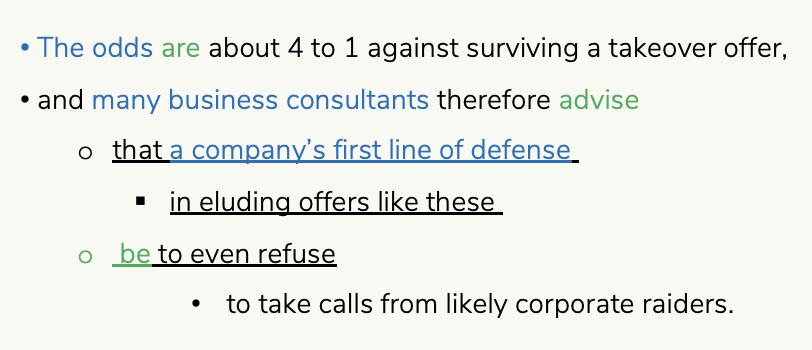generis wrote:
Project SC Butler: Day 22 Sentence Correction (SC1)
The odds are about 4 to 1 against surviving a takeover offer, and many business consultants therefore advise
that a company’s first line of defense in eluding offers like these be to even refuse to take calls from likely corporate raiders.
(A) that a company’s first line of defense in eluding offers like these be to even refuse
(B) that a company’s first line of defense in eluding such offers be to refuse even
(C) a company defending itself against offers of this kind that, as a first line of defense, they should even refuse
(D) companies which are defending themselves against such an offer that, as a first line of defense, they should even refuse
(E) that the first line of defense for a company who is eluding offers like these is the refusal even
Quote:
My clarifying comments are in blue typeface.
• Choice A is
awkward 
:thumbup: and poorly phrased:
these has no plural noun to which it can refer, and
even should be placed immediately before
to take calls, the phrase it modifies
• Choice B is best
• In C
the plural
they does not agree with the singular
companyeven is misplaced [
just as "even" is misplaced in option A]
and
advise . . . that . . . they SHOULD is unidiomatic [
because "advise" is used as a bossy verb, a context in which command subjunctive is required ]
• D has the plural
companies [
which is correct] but D retains the other flaws of C
• In E
who in place of
that is an inappropriate pronoun for company [
"who" is never used to refer to things, and always used to refer to people]these does not agree with the singular
offer, and
"is the refusal" should be "be to refuse" [
in order to construct the command subjunctive correctly as is done in option B]
The answer is BGENERAL COMMENTS Official explanation• I highlighted "awkward" and gave it mixed reviews in the explanation of option A
-- Good news :thumbup: : the author specifies why option A is "awkward."
The placement of "even" is incorrect.
-- Bad news

Writers of official explanations for GMAT questions use "awkward" imprecisely, cryptically, and inconsistently.
Option A is "awkward" because it is
-- either "correct in meaning but clumsily constructed"
-- or "constructed in a way that changes the meaning"
Thumbs up because "awkward" is explained.
Thumbs down because I do not encourage people to use "awkward"
as a reason to eliminate choices unless they are down to two correct options.
In that case, rhetoric and style make the difference, and lack of awkwardness creates better rhetorical effect.
• The command subjunctive"Advise" is a bossy verb in this context that requires "command subjunctive" construction.
The correct construction is:
bossy verb + THAT + subject + bare/base infinitive (remove the word "to": to be => be)
This sentence?
advise + THAT + a company's first line of defense + BE• "should" never belongs in the command subjunctive construction. A command implies "should."
• the command subjunctive does not use the conjugated verb after the THAT.
-- In option E, in other words, one problem is the use of "is the refusal."
Change the word
is to the word
be, and the command subjunctive is satisfied.
BE is the bare infinitive of TO BE.
THIS POST by GMAT Club founder bb is an excellent synopsis of the command subjunctive construction.
THIS POST discusses a specific example of that same construction.
**************
Prateekj05 constructed the best meaning of the sentence in his own words:
Meaning:
The author implies that the odds are about 4 to 1 against surviving a takeover offer. This means that the chances to not survive the takeover are 4 times more than surviving it. So many of the business
consultants advise that it is better to NOT take calls from "likely corporate raiders" i.e. who are expected to takeover your company. This is the first line of defence because if you don't take their calls, they won't make you an offer.The task is to explain. He did, in plain English.
Analysis of options is very good. I am torn about no mention of subjunctive.
habeebbaig , I'm glad you posted.
 Diwakar003
Diwakar003 , you mentioned "subjunctive," a subject that I think is important.
(The OE writer does, too.)
Best answer:
Prateekj05


 45%
(medium)
45%
(medium)
 34%
(02:08)
wrong
34%
(02:08)
wrong  based on 4337
sessions
based on 4337
sessions


























